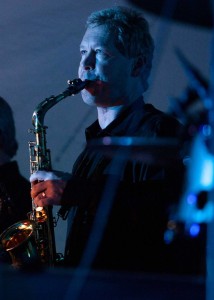Those new to jazz often ask, “What is jazz music?” Since its inception, the definition of jazz has been argued amongst those who create it and those who listen to it. The disagreements continue to this day. Some argue that it’s a tradition or an art form. Some say that it cannot be defined, but can be recognized. Finally, there are those who assert that it is whatever they say it is. My point is: there are going to be those who disagree with my answer to the question.
Jazz began in America and, in my opinion, represents the American spirit. It is planned spontaneity. In other words, as the performers play a written song, there are opportunities within the music to be spontaneously creative. The musicians create new melodies “on the fly” over a pre-determined chord progression using their knowledge of rhythm and harmony, as well as their intuition and responses to the other musician’s performances. Improvisation is what defines jazz, and it is a part of American life – in work, play, and in everyday conversation. I do not know of a better picture of democracy than a jazz band. Within the group is individual freedom, but a duty to the whole. That is, the musicians have the opportunity to express themselves; however, they cooperate with each other within the structure and framework of the song.
 What does it mean to improvise? To improvise is simply to create or do something new, unplanned, in response to what is occurring. Jazz musicians do this each time they play a song. A song is never performed exactly the same way, even if it’s performed by the same people. It becomes a musical conversation between the individual members of the group without a pre-planned conclusion. This is exactly what you do when you communicate with others. You are improvising. What you say depends upon what the other person says, who responds to what you are saying, and so forth. In jazz, this is done with instruments, and it really is a kind of musical dialogue.
What does it mean to improvise? To improvise is simply to create or do something new, unplanned, in response to what is occurring. Jazz musicians do this each time they play a song. A song is never performed exactly the same way, even if it’s performed by the same people. It becomes a musical conversation between the individual members of the group without a pre-planned conclusion. This is exactly what you do when you communicate with others. You are improvising. What you say depends upon what the other person says, who responds to what you are saying, and so forth. In jazz, this is done with instruments, and it really is a kind of musical dialogue.
Some say that jazz is a language. We use language to express ideas. Nearly everything in life can be communicated through languages like French, Spanish, or English. However, these formal languages are limited in the way they can express emotion. Music, however, communicates feelings to every human being, regardless of race or culture. This is why every culture has its music. This is also why popular music is such a huge industry, and why most people would say that they are far more moved by music than spoken words.
In jazz, the musicians express the temporal emotions during their performance. Improvisation makes jazz different from most other forms of music, which are pre-composed and then performed as the writer intended. Most of the music heard during a jazz solo is composed on the spot by the musicians, and played according to the way they feel at the time. This kind of spontaneity means the listener has to be attentive to the continually changing aspects of the song’s interpretation. In this way, classical music is similar to reading a book, while jazz is more like a conversation that evolves over time.
Jazz is not simple, which is why it does not have the easy appeal of pop and rock. It is complex, and it may take a number of listenings to appreciate the various complexities in a jazz performance. That’s not bad! You generally get out of things what you put into them. The more effort you put into seeking answers to the questions, “Where is the conversation going?”, “How and why does this performance move me emotionally?”, and even, “What is jazz music?” the more you will get out of your listening.
If you’d like to receive some free jazz downloads, please enter your name and email address in the boxes at the upper right of this page. Mobile users, click HERE.
